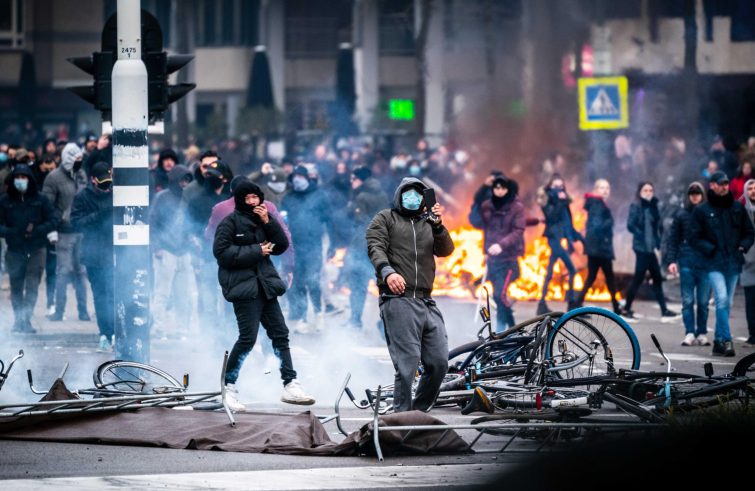
On January 23, the Lower House of the Dutch Parliament introduced a curfew that will remain in force until March 3. The measure is the first since the Second World War, Mark Rutte said on 9 February, but the current situation of rampant infections calls for exceptional measures. The decision was put to a vote in Parliament as it is too sensitive to be taken by an interim government. In fact, Prime Minister Mark Rutte and his cabinet stepped down on January 15, a few months ahead of the scheduled end of term, over the so-called “day-care allowance affair”, concerning false allegations of fraud by the government against thousands of families. Rutte now heads an interim government, pending general elections on 17 March. As for the curfew, the measure was met with opposition by some segments of the population who not only expressed their dissent but also sparked riots and clashes with the police in several cities. SIR spoke to the Bishop of Rotterdam, President of the Bishops’ Conference, Msgr. Hans van den Hende, about the situation in the country.
 Could you explain the situation in the country and describe your perception of people suffering from the pandemic? Are people being changed by this situation?
Could you explain the situation in the country and describe your perception of people suffering from the pandemic? Are people being changed by this situation?
The whole country has been aware of the risks posed by COVID-10 for almost a year now. At first, the government described the measures as an ‘intelligent lockdown’, highlighting citizens’ freedom and placing individual responsibility on each member of society in tackling the threats posed by the epidemic. Over time, however, the government decided to enact stricter provisions.
The closing of schools and shops has not been well received.
The Government has recently introduced a night-time curfew. Some citizens found this unacceptable, although such measures had already been introduced in other countries.
 Are the anti-lockdown riots and protests an expression of societal tension and suffering linked to the pandemic, or do they transcend it?
Are the anti-lockdown riots and protests an expression of societal tension and suffering linked to the pandemic, or do they transcend it?
The riots only lasted a few days in a limited number of cities and towns. According to media reports, some groups deliberately ignited violent protests. But the vast majority of Dutch people comply with the specific anti-COVID-19 regulations, in the belief that freedom comprises not only freedom of movement but also mutual responsibility, especially when it comes to public health.
How is the Christian community reacting: are faith and hope a true help for people?
Christian communities have expressed their concerns regarding COVID-19. Some Protestant communities invoked their special status on the grounds of freedom of religion and continued their services with large groups and choirs. The Catholic bishops expressed the same concern as the government over public health, and drafted a special protocol dealing with liturgical celebrations in churches and monasteries throughout the ecclesiastical province. Currently
the faithful must make reservations to attend Eucharistic and other liturgical celebrations
(each religious service has a maximum capacity of 30 people). The distribution of the Holy Communion occurs from behind a screen and by means of a “tenaculum”. The bishops explained that the sacred liturgy should never represent a risk of contagion.
Have you noticed anything new emerging among the faithful in the country?
Pope Paul VI has taught us that the Church is called to establish a civilisation of love in the world. The mission of the Church – as a network of love and charity (cf. Jn 15:1-17) – includes diakonia and caritas. Virtually all parishes in the Netherlands have a parish Caritas (whose directors are appointed by the diocesan bishop). These charities currently support various projects designed to help parishioners and other people during this time of pandemic. For example, in several parish churches, the faithful were asked to bring long shelf-life foods when they go to church for Eucharistic adoration to support the city’s food bank, since
of love and charity (cf. Jn 15:1-17) – includes diakonia and caritas. Virtually all parishes in the Netherlands have a parish Caritas (whose directors are appointed by the diocesan bishop). These charities currently support various projects designed to help parishioners and other people during this time of pandemic. For example, in several parish churches, the faithful were asked to bring long shelf-life foods when they go to church for Eucharistic adoration to support the city’s food bank, since
Prayer and charity go hand in hand!
In my diocese of Rotterdam I awarded the ‘St. Elisabeth Prize’ to over 50 parish and parish Caritas projects in recognition of the major contribution of charitable activity to the mission of the Church, and in appreciation of the workers involved.
 In your opinion, is the political response in line with the needs of the people?
In your opinion, is the political response in line with the needs of the people?
The government has enforced regulations and rules to protect citizens from the spread of COVID-19. However, in this period of pandemic, focusing on the national level is not enough. It is equally necessary to acknowledge the hardships and sufferings connected with the pandemic in other areas of the world (to name a few: the needs of the refugees in Lesbos, famine and thirst, poverty and medicine shortages) instead of focusing exclusively on the challenges in our own country. During this period, the government failed to expand the vision of Dutch citizens in this respect.










